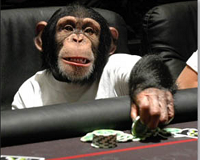-
Good Game Network
-
Winning Poker Network
-
Boss Poker Network
-
Independent Network
-
Independent Network
-
Cake Gaming Network
-
Horizon Poker Network Network
-
Chico Network
-
Horizon Poker Network Network
-
Independent Network
-
iPoker Network
-
Independent Network
-
iPoker Network
Why You Should Avoid Being A 3-Bet Monkey
 When online poker players start playing and thinking about the game at a deeper level, the concept of three-betting is one of the most basic pieces of poker strategy they learn since it is not a difficult concept to explain to a beginner.
When online poker players start playing and thinking about the game at a deeper level, the concept of three-betting is one of the most basic pieces of poker strategy they learn since it is not a difficult concept to explain to a beginner.
A three-bet is simply a term used in poker that means to re-raise a pre-flop raise. Three-bets can definitely be a powerful weapon in your poker arsenal when you know how to properly utilize them. And once you start integrating a three-betting strategy into your game, you will need to start three-betting light with non premium hands you wouldn’t normally three-bet with like suited connectors to balance your range against the better players, as this will help you to get paid off when you have a big hand.
However, with more and more online poker players 3-betting nowadays, it seems as though some opponents are doing it because it’s the fashionable thing (much like bluffing) to do without putting much thought into why they are making the three-bet in the first place. Just because 3-betting does have its advantages and can be profitable doesn’t mean you should be three-betting every time you want to play a hand.
Ask Yourself: Why Are 3-Betting?
You first want to understand the reason why you are deciding to make a three-bet instead of blindlessly going for a 3-bet simply because you want to gain initiative in the hand or to fold out players who have position on you. There are two main reasons for three betting. You can either three-bet for value with your premium hands like Aces or Kings or you can three-bet as a bluff.
If you are three-betting for value to extract the maximum amount of chips from worse hands that can call, you have to be sure that your opponent is going to call your three-bet with a worse hand, otherwise you’re just bloating the pot with a marginal hand that can end up being a costly mistake.
Like all situations in the game of poker, you may play differently depending on the type of opponent you’re playing against. If you’re playing against a tight player, then you can safely assume they will only continue against a three-bet with a “tight” range of hands. On the other hand, a loose player is likely to continue versus a three-bet with a much wider range of hands.
So the range of hands you can expect to profitably three-bet is greatly influenced by the player’s three-betting calling range, his four-bet range, as well as your table image. Otherwise you’re just re-raising and putting more chips into the pot to donate them to someone else.
Let’s illustrate this with an example. You’re sitting in the small blind with AJ and a fairly tight player on the button raises. You’ll see a lot of bad aggressive players three-bet in this situation, because they think are probably ahead of their opponent’s range of hands they would be raising with from the button.
But in this situation let’s assume the initial raiser is calling a 3-bet with AQ+/99+. Against such a tight range we’re value-towning ourselves the times an ace flops and even when you’re not dominated, and up against a hand like TT, the other player will be able to easily get away from their hand and you’ll only win a small pot. You will also rarely get folds on the flop when you make a continuation bet the times you’ve missed, since your opponent won’t fold overpairs and stuff like AK/AQ on low raggy flops.
When 3-Betting Gets Picked up by Your Opponents
More than just that, if you begin relentlessly three-betting your opponents, they are going to stop giving you any credit, and either start four-betting you light or looking you up more often in three-bet pots instead of always giving you credit for a big hand, which would be disastrous in terms of trying to get your bluffs through to steal more pots.
When this starts to happen, you have little to no fold equity pre-flop and post-flop, so the value of three-betting with weaker hands in an attempt to get folds from your opponents goes down considerably and three-betting regardless of what you have in these situations would just be silly. Now would be a good time to stop being a 3-bet monkey and to tighten up the range of hands you’re deciding to 3-bet with.
Finally, you have to be conscious of your image at the table regardless of the stakes you’re playing. Even though players at the micro stakes are going to be terrible for the most part, they will see that you’ve three-bet twice in the last orbit, for example, so attempting a three-bet bluff in which the plan is to get folds from your opponents over the course of the next few hands isn’t going to be a good time.











